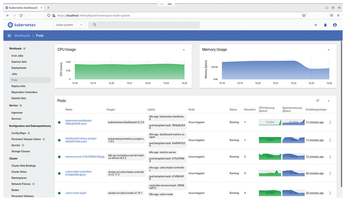Useful innovations in Ubuntu 22.04 LTS
Container Love
The container and VM manager LXD also comes with numerous new features, with version 5.0 now covering the same feature set for VMs as for containers. In multiuser operation, several users can start their projects separately. VMs now support virtual TPMs and PCI passthrough and can be migrated on-the-fly. In addition, LXD 5.0 lets you hot plug hard disks and USB sticks into VMs.
When it comes to Docker, Canonical points out that it not only offers Ubuntu itself on Docker Hub, but also numerous validated container images with MySQL, PostgreSQL, and NGINX. New additions include Grafana Loki, Apache Kafka, and Apache Cassandra.
If you are looking to build a larger container environment, you will find Kubernetes v1.23 in Ubuntu 22.04 [8]. While Canonical recommends its Charmed Kubernetes for enterprise deployments, the leaner MicroK8s (Figure 3) instead targets users who want to run the container orchestrator in edge computing or the Internet of Things (IoT) area. And, last but not least, Canonical Kubernetes also enables managed containerization with a managed Kubernetes.
 Figure 3: A local Kubernetes, including a dashboard, can be set up quite quickly thanks to MicroK8s.
Figure 3: A local Kubernetes, including a dashboard, can be set up quite quickly thanks to MicroK8s.
Development Drive
Developers use Ubuntu because it supports numerous programming languages out of the box. And Windows users now also have an easy option for using familiar Linux tools in Windows Subsystem for Linux (WSL) 2, which now also supports Ubuntu 22.04.
Of particular interest to developers, PHP 8.1.2 is included. If you want to move up from version 7.x, note that version 8 removes some deprecated functions. As a result, some code adjustments may be needed. In return, PHP 8 promises better performance. Ruby 3.0 runs up to three times faster than its predecessor thanks to the MJIT compiler, concurrency, and static types, which is likely to go down well with its followers.
Python fans can look forward to version 3.10.4 and the Python-based Django web framework in the distribution. Django is available as version 3.2.12 with long-term support and offers asynchronous views and middleware, among other things. A word of caution: There is a risk of some incompatibility here during the upgrade. Ubuntu 22.04 also includes Go v1.18.x, Rust v1.58, and OpenJDK 11 for Java developers.
On the compiler side, Ubuntu has a great feature set with LLVM 14 and GCC 11.2.0. On the database side, PostgreSQL 14 and MySQL 8.0 impress with some new features. For PostgreSQL 14, stored procedures now return data via OUT parameters, simplifying the move from Oracle to PostgreSQL. MySQL admins can disable the audit log for sessions.
Point of View
With every LTS release, Canonical explains what it considers to be the highlights of the new version, which allows conclusions to be drawn about what customers have requested. This time, the company highlights native support for NVIDIA's vGPU software 14.0, among other things. This allows the virtual GPUs of many VMs to be linked together to accelerate machine learning and other scenarios with workloads that process serious amounts of data. In addition, Ubuntu 22.04 supports NVIDIA's AI Enterprise software suite, which offers advantages in a scientific context and high-performance computing.
If you want to use Azure's confidential VMs, Ubuntu is the only Linux distribution that supports the feature. Multipass [9], a GPL software driven by Canonical, lets you start an Ubuntu VM on Windows, macOS, and Linux with a simple command and (now) also supports Apple's M1 chip. A real-time kernel (currently still in beta) is expected to find favor especially in the telecommunications industry, for example, for real-time applications in the 5G sector.
« Previous 1 2 3 Next »
Buy this article as PDF
(incl. VAT)
Buy Linux Magazine
Subscribe to our Linux Newsletters
Find Linux and Open Source Jobs
Subscribe to our ADMIN Newsletters
Support Our Work
Linux Magazine content is made possible with support from readers like you. Please consider contributing when you’ve found an article to be beneficial.

News
-
Canonical Releases Ubuntu 24.04
After a brief pause because of the XZ vulnerability, Ubuntu 24.04 is now available for install.
-
Linux Servers Targeted by Akira Ransomware
A group of bad actors who have already extorted $42 million have their sights set on the Linux platform.
-
TUXEDO Computers Unveils Linux Laptop Featuring AMD Ryzen CPU
This latest release is the first laptop to include the new CPU from Ryzen and Linux preinstalled.
-
XZ Gets the All-Clear
The back door xz vulnerability has been officially reverted for Fedora 40 and versions 38 and 39 were never affected.
-
Canonical Collaborates with Qualcomm on New Venture
This new joint effort is geared toward bringing Ubuntu and Ubuntu Core to Qualcomm-powered devices.
-
Kodi 21.0 Open-Source Entertainment Hub Released
After a year of development, the award-winning Kodi cross-platform, media center software is now available with many new additions and improvements.
-
Linux Usage Increases in Two Key Areas
If market share is your thing, you'll be happy to know that Linux is on the rise in two areas that, if they keep climbing, could have serious meaning for Linux's future.
-
Vulnerability Discovered in xz Libraries
An urgent alert for Fedora 40 has been posted and users should pay attention.
-
Canonical Bumps LTS Support to 12 years
If you're worried that your Ubuntu LTS release won't be supported long enough to last, Canonical has a surprise for you in the form of 12 years of security coverage.
-
Fedora 40 Beta Released Soon
With the official release of Fedora 40 coming in April, it's almost time to download the beta and see what's new.

